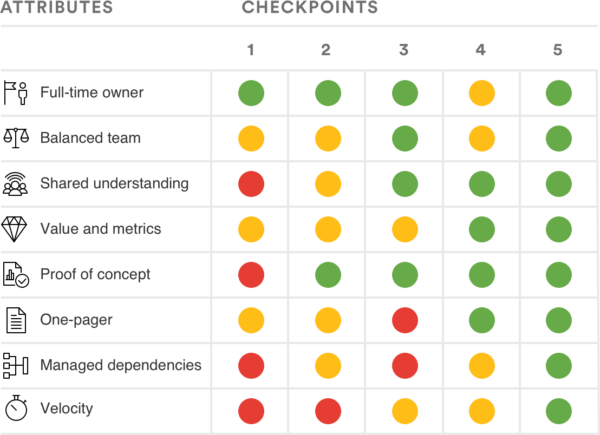Society loves to celebrate and glorify the individual – Jobs, Musk, Lebron James. We all do it. But individuals don’t accomplish monumental achievements on their own. Success is driven by teams. From sending a rover to Mars to decoding the human genome or building driverless cars, teams accomplish far more than any single person ever could.
Take sports, for example. Great teams often have individual superstars, but winning teams focus on great teamwork. Drills, plays, practice, trust, communication. Without those, you lose – even with the best player in the world.
So why isn’t that same principle applied to business? Businesses tend to assume if they recruit the best of the best and give them great tools, magic will just happen. But great people + best technology ≠ team potential unleashed. Organizations today are built around highly empowered teams, yet companies focus so much attention on individual performance.
What about team performance?
The question becomes: how do we set teams up for success? How do we overcome the bigger systemic issues underlying the complexity of teamwork and help people work with each other towards a common goal?

Introducing the Team Health Monitor
Like a physical for your team, but less… invasive
A few years ago, we set out to understand why some teams excelled and others failed. By analyzing the dynamics of hundreds of teams, we identified eight attributes shared by healthy, high-performing teams. We used this data to create a Team Health Monitor (the first and only of its kind) to help everyone better understand how they work together, communicate, build trust, set goals, maintain velocity and establish measures of success, and track their improvement over time.
 Much like an annual physical, the Team Health Monitor is meant to be preventative – a check-in on your team’s vital signs. It’s not a retroactive performance review, which reflects what happened in the past and causes people to put their guard up. It’s a framework for having candid conversations about where teams are and are not, aligned with these key attributes. Any teammate can initiate it and each session takes one hour: a bit of prep and set-up, 20 minutes to talk through the assessment, and 20 minutes to reflect on what came out and agree on remedies.
Much like an annual physical, the Team Health Monitor is meant to be preventative – a check-in on your team’s vital signs. It’s not a retroactive performance review, which reflects what happened in the past and causes people to put their guard up. It’s a framework for having candid conversations about where teams are and are not, aligned with these key attributes. Any teammate can initiate it and each session takes one hour: a bit of prep and set-up, 20 minutes to talk through the assessment, and 20 minutes to reflect on what came out and agree on remedies.
We trialed the Team Health Monitor across hundreds of teams from a wide swath of companies and industries, and today we are open sourcing it so more teams can use it and become better equipped to solve the challenges they face.
Because different teams tackle different challenges, we’re launching Team Health Monitors designed for several specific team types with more to follow:
- Leadership teams are influencers and decision-makers who work on the longer-term vision and high-level initiatives. While you might not be executing day-to-day projects, you lead the people who are.
- Project teams act on the mission to deliver awesome work to their customers, such as shipping new product features, delivering tactical projects or even launching a new service.
- Service teams, whether technical or non-technical, are about high-volume and quality response. Your work is queue-based and you’re likely working toward daily or weekly quotas.
Prescriptions for healthy teams
Team Health Monitors surface the strengths and weaknesses of teams, but identifying issues is only the first step. To make results actionable, we created a Team Playbook – designed using a mix of agile, lean and design thinking – to help teams self-correct.
Used together, it’s like taking your team to the doctor’s office: the Team Health Monitor is the physical and the plays are exercises your doctor gives you to get fit. The Team Playbook is a customizable tool designed by teams, for teams, to help them get sh*t done without getting in the way of themselves. For example, if your team is struggling with navigating conflicting priorities, it will help you diagnose the issue and guide you through plays designed to help your team solve the specific problem and get back on track.
We’re launching with 20 plays that have been battle-tested by Atlassian teams and will add more over time.

Making teamwork work
So why are we sharing this with the world? Because we’re still selfishly driving toward our mission of unleashing the potential in every team. If we’re truly going to tackle the daunting challenges we face as a society, we need to stop wasting time figuring out how to work together and more time actually working. This is your chance to take your team, give it a physical and agree on a training regime.
There are a lot of books out there that wax poetic about Silicon Valley dream-teams, but they don’t tell you where to start with your team. Put the “7 tips for X, Y, Z” book back on the nightstand. The potential in your teams is in your teams, not on page 17.
Atlassian is a people business. And that’s what the Team Playbook is about – helping people deliver the best possible results for their team and company overall.







































